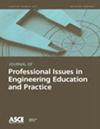Necessity of Mentoring in Entrepreneurship Education: Reflection by Practitioners
Q1 Business, Management and Accounting
Journal of Professional Issues in Engineering Education and Practice
Pub Date : 2019-01-01
DOI:10.1061/(ASCE)EI.1943-5541.0000399
引用次数: 4
Abstract
The significance of entrepreneurship education and its potential benefit to the wider community has led higher education institutions and providers in the United Kingdom and other countries to facilitate its pedagogy and andragogy in many various forms. It is mostly taught as an elective module, embedded into various course curriculums, or offered as a stand-alone degree program. The ultimate aim of these modules usually is to engender entrepreneurial competencies in students (Fayolle 2013; Gartner 1990; Matlay 2009; Khalefa et al. 2013; Middleton 2013; Alsharief and El-Gohary 2016; Eid et al. 2017). Meanwhile, the delivery of entrepreneurship by various Higher Education Institutions (HEIs) and internal processes such as thinkingtakes various forms, such as classroom focus, hands-on approaches to setting up a business, writing business plans, case studies, role play, provision of incubators, competitions, conferences, simulations, and so on (Henry et al. 2005). However, an important facet of the delivery and success of entrepreneurship education is mentoring, especially for those intending to explore their ideas. In this regard, mentoring boosts the likelihood of success being achieved by any budding entrepreneur, and it complements other forms of delivery (Peterman and Kennedy 2003). Furthermore, entrepreneurship education in HEIs provides an avenue for students to interact with others and bring all their past and present learning to bear on entrepreneurship-themed topic(s). As such, mentoring is a significant aspect of entrepreneurship education, predominantly in the formation and running of a business (El-Gohary and Eid 2013; El-Gohary et al. 2012, 2016). The experience of mentoring is mostly gained from an experienced staff member or visiting entrepreneurs to guide a student through this process. The mentoring process provides equal benefits to the mentor as well as the mentee, and as a secondary benefit provides the opportunity for reverse mentoring through the mentee. Critical reflective practice is a key part of mentors’ personal and professional development, and it enables them to improve and be accountable as academics or practitioners to enhance the mentoring process better. This paper illustrates the need to further encourage reflection as part of mentoring and leverage the immense knowledge that could be gained from reverse mentoring during the process. As it is evident that mentoring has engendered success in various phases of entrepreneurship (Bridgstock 2013; Rideout and Gray 2013), this paper will highlight the benefits of mentoring in entrepreneurship education for both the mentee and mentor via reflection and reverse mentoring as supported by some scholars in the field, such as Marcinkus (2012). The personal narrative here explores and reflects on the experience of practitioners and identifies areas to be explored in the future; this will influence practice and enhance students’ experience. The paper provides engineering students and educators with a great opportunity to understand entrepreneurship mentoring, which might help in creating a new generation of engineering entrepreneurs.创业教育中辅导的必要性:从业者的思考
创业教育的重要性及其对更广泛社区的潜在好处促使英国和其他国家的高等教育机构和提供者以多种形式促进其教育学和学术。它主要作为选修模块教授,嵌入各种课程,或作为独立的学位课程提供。这些模块的最终目的通常是培养学生的创业能力(Fayolle 2013;Gartner 1990;Matlay 2009;Khalefa等人2013;Middleton 2013;Alsharief和El Gohary 2016;Eid等人2017)。与此同时,各种高等教育机构(HEI)和内部流程(如思考)提供的创业服务采取了各种形式,如课堂关注、创业实践方法、撰写商业计划、案例研究、角色扮演、提供孵化器、竞赛、会议、模拟等(Henry等人,2005)。然而,创业教育的实施和成功的一个重要方面是指导,尤其是对那些打算探索自己想法的人。在这方面,辅导提高了任何崭露头角的企业家取得成功的可能性,并补充了其他形式的交付(Peterman和Kennedy,2003年)。此外,高等学校的创业教育为学生提供了一个与他人互动的途径,并将他们过去和现在的所有学习都集中在创业主题上。因此,辅导是创业教育的一个重要方面,主要是在企业的形成和运营中(El Gohary和Eid 2013;El Gohari等人20122016)。辅导的经验大多来自经验丰富的工作人员或来访的企业家,以指导学生完成这一过程。辅导过程为导师和学员提供了同等的好处,作为次要的好处,通过学员提供了反向辅导的机会。批判性反思实践是导师个人和专业发展的关键部分,它使他们能够作为学者或从业者改进并承担责任,从而更好地加强指导过程。本文阐述了进一步鼓励反思作为指导的一部分的必要性,并利用在这一过程中从反向指导中获得的巨大知识。很明显,辅导在创业的各个阶段都取得了成功(Bridgstock 2013;Rideout和Gray,2013年),本文将在该领域一些学者的支持下,通过反思和反向辅导,强调辅导在创业教育中对受试者和导师的好处,如Marcinkus(2012)。这里的个人叙述探索和反思了从业者的经验,并确定了未来需要探索的领域;这将影响实践,增强学生的体验。这篇论文为工程专业的学生和教育工作者提供了一个了解创业指导的绝佳机会,这可能有助于培养新一代的工程企业家。
本文章由计算机程序翻译,如有差异,请以英文原文为准。
求助全文
约1分钟内获得全文
求助全文
来源期刊
CiteScore
3.10
自引率
0.00%
发文量
0
审稿时长
>12 weeks
期刊介绍:
The Journal of Professional Issues in Engineering Education and Practice presents issues of broad professional interest and diverse views of engineering education, and professional practice. Papers examine the relationships between civil engineering and other disciplines and professions, with emphasis on the engineer"s and constructor"s obligations and responsibilities. Topics include engineering education at all levels, professional practice issues, ethics, and history and heritage.

 求助内容:
求助内容: 应助结果提醒方式:
应助结果提醒方式:


